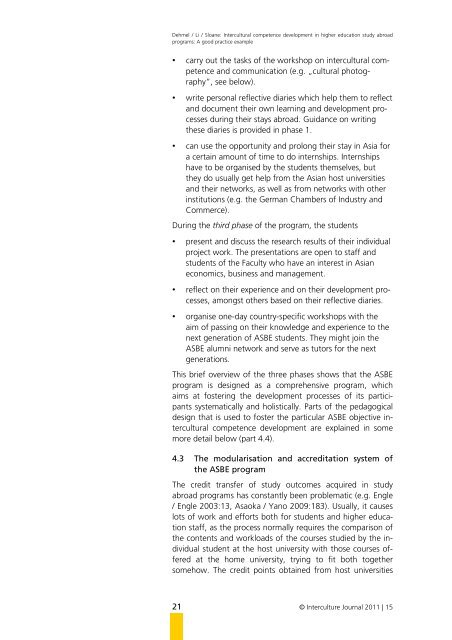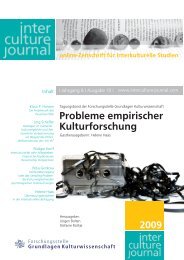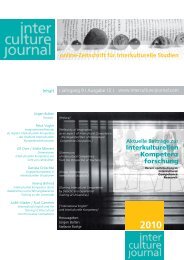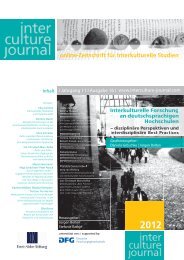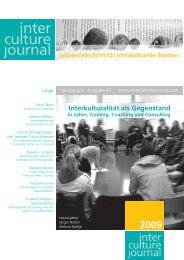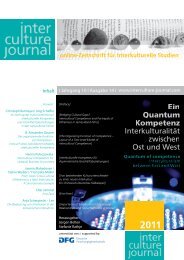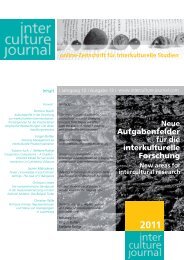Aktuelle Anwendungsfälle Interkultureller Kommunikation | Current ...
Aktuelle Anwendungsfälle Interkultureller Kommunikation | Current ...
Aktuelle Anwendungsfälle Interkultureller Kommunikation | Current ...
Erfolgreiche ePaper selbst erstellen
Machen Sie aus Ihren PDF Publikationen ein blätterbares Flipbook mit unserer einzigartigen Google optimierten e-Paper Software.
Dehmel / Li / Sloane: Intercultural competence development in higher education study abroad<br />
programs: A good practice example<br />
• carry out the tasks of the workshop on intercultural competence<br />
and communication (e.g. „cultural photography”,<br />
see below).<br />
• write personal reflective diaries which help them to reflect<br />
and document their own learning and development processes<br />
during their stays abroad. Guidance on writing<br />
these diaries is provided in phase 1.<br />
• can use the opportunity and prolong their stay in Asia for<br />
a certain amount of time to do internships. Internships<br />
have to be organised by the students themselves, but<br />
they do usually get help from the Asian host universities<br />
and their networks, as well as from networks with other<br />
institutions (e.g. the German Chambers of Industry and<br />
Commerce).<br />
During the third phase of the program, the students<br />
• present and discuss the research results of their individual<br />
project work. The presentations are open to staff and<br />
students of the Faculty who have an interest in Asian<br />
economics, business and management.<br />
• reflect on their experience and on their development processes,<br />
amongst others based on their reflective diaries.<br />
• organise one-day country-specific workshops with the<br />
aim of passing on their knowledge and experience to the<br />
next generation of ASBE students. They might join the<br />
ASBE alumni network and serve as tutors for the next<br />
generations.<br />
This brief overview of the three phases shows that the ASBE<br />
program is designed as a comprehensive program, which<br />
aims at fostering the development processes of its participants<br />
systematically and holistically. Parts of the pedagogical<br />
design that is used to foster the particular ASBE objective intercultural<br />
competence development are explained in some<br />
more detail below (part 4.4).<br />
4.3 The modularisation and accreditation system of<br />
the ASBE program<br />
The credit transfer of study outcomes acquired in study<br />
abroad programs has constantly been problematic (e.g. Engle<br />
/ Engle 2003:13, Asaoka / Yano 2009:183). Usually, it causes<br />
lots of work and efforts both for students and higher education<br />
staff, as the process normally requires the comparison of<br />
the contents and workloads of the courses studied by the individual<br />
student at the host university with those courses offered<br />
at the home university, trying to fit both together<br />
somehow. The credit points obtained from host universities<br />
21 © Interculture Journal 2011 | 15


